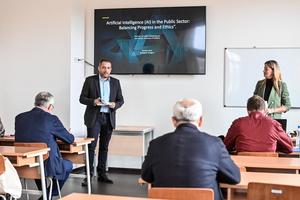Artificial Intelligence (AI) in the Public Sector: Balancing Progress and Ethics was the title of a lecture by Luljeta Plakolli-Kasumi, former Acting Rector and researcher at the University of Pristina, as part of the Ludovika Scholars guest researcher program at the University of Public Service on 11 October 2023.
In the first part of her presentation, she gave an overview of the main components of the balance between AI and ethics, and then outlined the key applications of AI in the public sector.
The presentation said that the use of artificial intelligence technologies in the public service requires a number of ethical considerations. The most significant of these are issues of bias, transparency, accountability and privacy, but they also include risk factors such as the spreading of misinformation or the launching of cyberattacks. The speaker gave several examples and case studies to illustrate these risk factors.
As an example of bias, she highlighted the tools of various criminal justice systems, including both location-based algorithms and the use of individuals' data in police records. On transparency, the speaker cited the Schufa case as an example. The Schufa is a German agency that calculates people's creditworthiness using automated systems, but Article 22 of the General Data Protection Regulation (GDPR) gives individuals the right not to be subject to decisions based solely on automated processing or profiling when those decisions have significant legal or economic effects. The suggestion in the Schufa case that ‘transparency obligations should be extended to cases not strictly falling under Article 22 of the GDPR’ has implications for public service agencies. In the field of privacy, the guest speaker mentioned the facial recognition systems already operating in China and Google's Nightingale project as examples.
In her presentation, Luljeta Plakolli-Kasumi also discussed the adversarial impact of training AI models on the environment and the possible solutions for implementing sustainable AI. On one side AI can bring exciting advancements and boost productivity, but on the other side, it can also lead to certain jobs being taken over by machines. However, AI can also create new jobs and the potential impact of these changes on workers needs to be addressed.
The dilemma between innovation and misinformation is one of the great challenges of ethical AI. Deepfakes and chatbots are particularly suitable for spreading misleading or harmful content. Striking a balance between promoting innovations and preventing the spread of misinformation requires improved detection methods, educating users, and implementing regulations.
According to Luljeta Plakolli-Kasumi, the condition for balancing progress and ethics is to find the sweet spot where innovation thrives without compromising ethical, legal, and societal values. The goal is to achieve responsible AI, where AI truly benefits society.
Following her public lecture in the morning, the guest researcher gave an opening presentation at the Institute of the Information Society's research workshop in the afternoon, entitled Advancing AI in Public Service: Ethical Implications, Case Studies, and Best Strategies. In her presentation she first reviewed possible definitions of AI based on different approaches, and then, based on the European Commission's report, she presented some of the AI applications already used in public services and how they are expected to change workflows.
Artificial intelligence has applications in many areas of public services, such as public safety, healthcare, fraud detection, education, urban planning, compliance monitoring, data analysis, resource allocation or environmental monitoring. Luljeta Plakolli-Kasumi presented several developments that are already being used in the fields of education, health, transport and public safety.
The workshop also covered ethical considerations in the use of AI, including data protection and integrity, bias management, transparency and also liability issues. The speaker also presented the characteristics of the different national AI strategies and the main non-binding recommendations and principles.
The workshop led to an intensive discussion on the practical application of AI, in particular on the link between European regulatory solutions and the competitiveness of the European economy.
Text: Institute of the Infomation Society
Photo: Szilágyi Dénes




